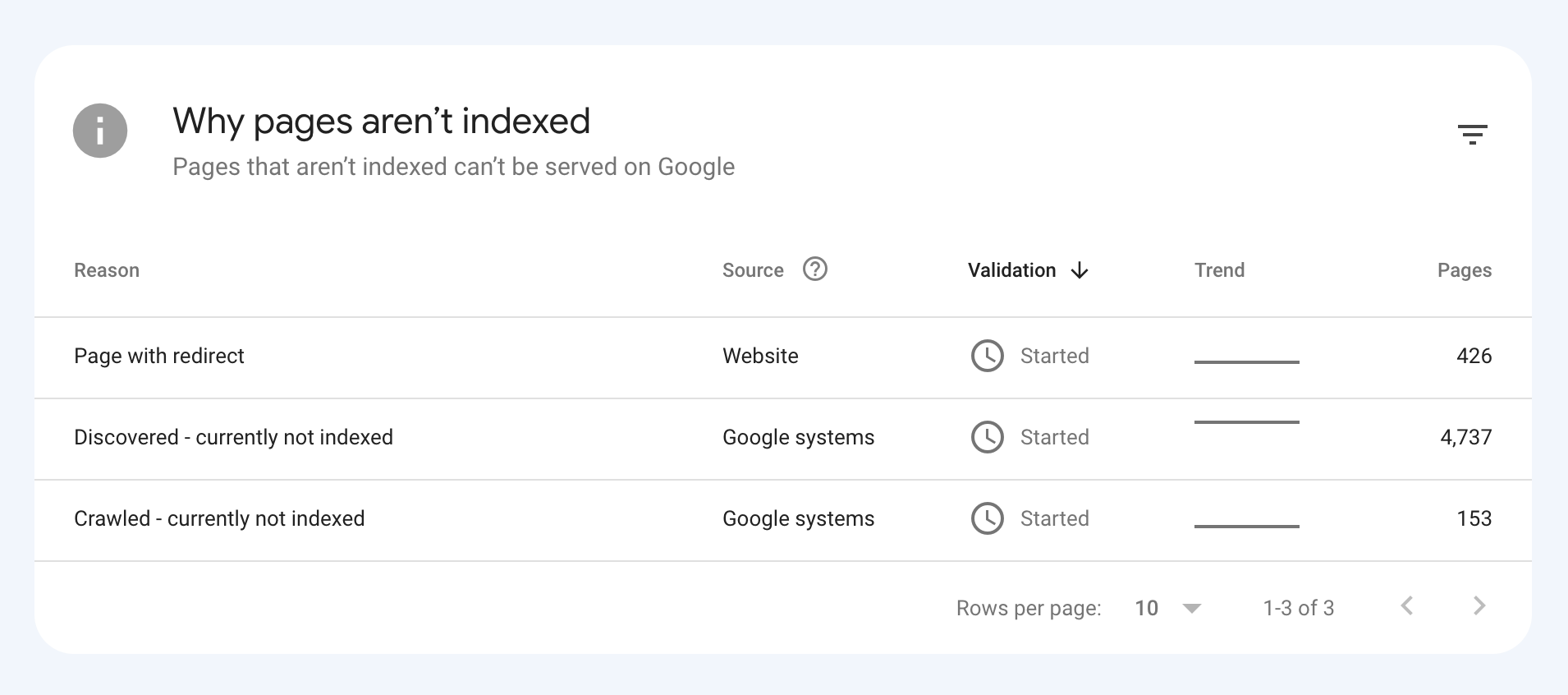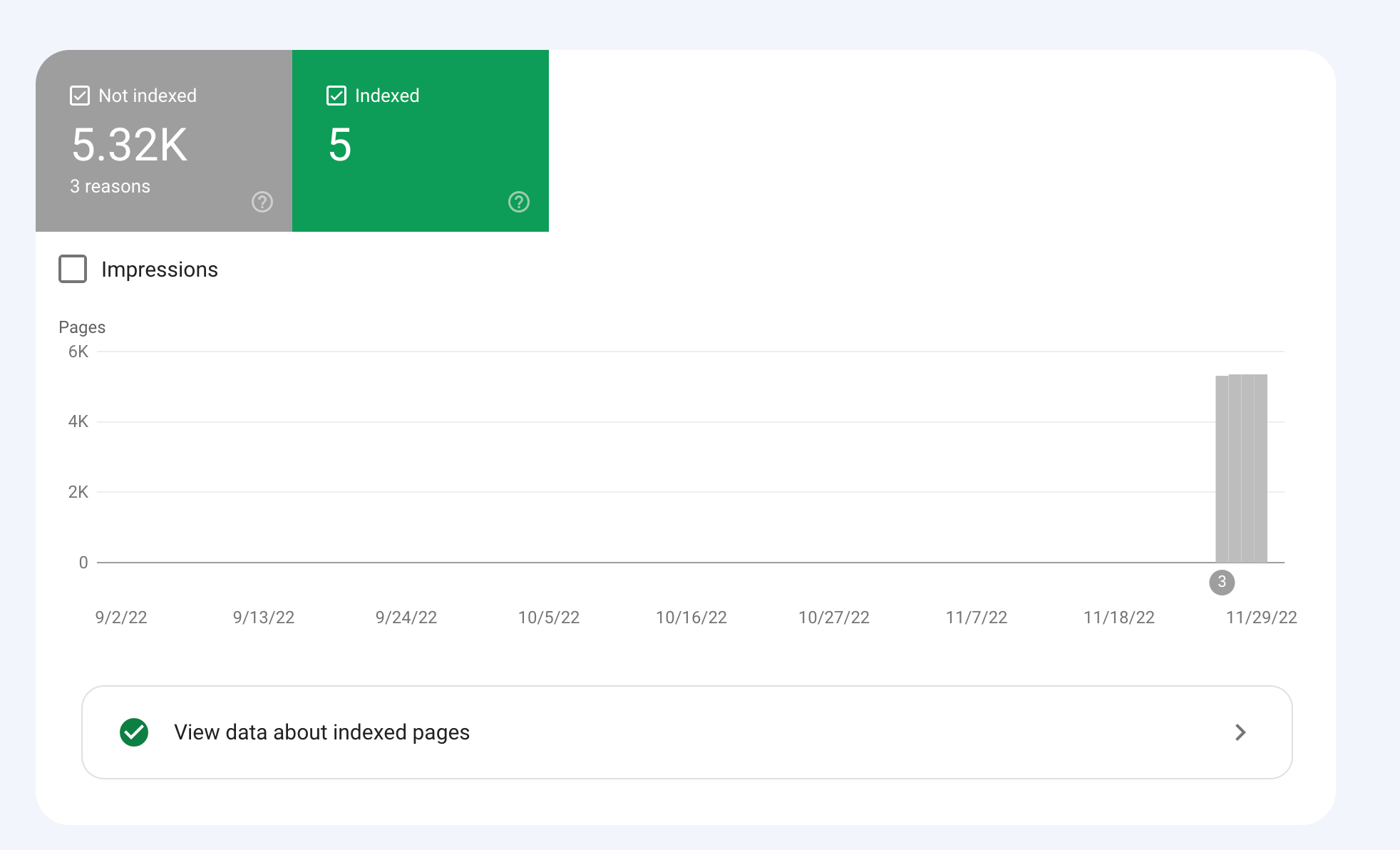Moz Q&A is closed.
After more than 13 years, and tens of thousands of questions, Moz Q&A closed on 12th December 2024. Whilst we’re not completely removing the content - many posts will still be possible to view - we have locked both new posts and new replies. More details here.
How to index e-commerce marketplace product pages
-
Hello!
We are an online marketplace that submitted our sitemap through Google Search Console 2 weeks ago. Although the sitemap has been submitted successfully, out of ~10000 links (we have ~10000 product pages), we only have 25 that have been indexed.
I've attached images of the reasons given for not indexing the platform.


How would we go about fixing this?
-
To get your e-commerce marketplace product pages indexed, make sure your pages include unique and descriptive titles, meta descriptions, relevant keywords, and high-quality images. Additionally, optimize your URLs, leverage schema markup, and prioritize user experience for increased search engine visibility.
-
@fbcosta i hve this problem but its so less in my site
پوشاک پاپیون -
I'd appreciate if someone who faced the same indexing issue comes forward and share the case study with fellow members. Pin points steps a sufferer should do to overcome indexing dilemma. What actionable steps to do to enable quick product indexing? How we can get Google's attention so it can start indexing pages at a quick pace? Actionable advice please.
-
There could be several reasons why only 25 out of approximately 10,000 links have been indexed by Google, despite successfully submitting your sitemap through Google Search Console:
Timing: It is not uncommon for indexing to take some time, especially for larger sites with many pages. Although your sitemap has been submitted, it may take several days or even weeks for Google to crawl and index all of your pages. It's worth noting that not all pages on a site may be considered important or relevant enough to be indexed by Google.
Quality of Content: Google may not index pages that it considers low-quality, thin or duplicate content. If a significant number of your product pages have similar or duplicate content, they may not be indexed. To avoid this issue, make sure your product pages have unique, high-quality content that provides value to users.
Technical issues: Your site may have technical issues that are preventing Google from crawling and indexing your pages. These issues could include problems with your site's architecture, duplicate content, or other issues that may impact crawling and indexing.
Inaccurate Sitemap: There is also a possibility that there are errors in the sitemap you submitted to Google. Check the sitemap to ensure that all the URLs are valid, the sitemap is up to date and correctly formatted.
To troubleshoot this issue, you can check your site's coverage report on Google Search Console, which will show you which pages have been indexed and which ones haven't. You can also check your site's crawl report to see if there are any technical issues that may be preventing Google from crawling your pages. Finally, you can also run a site audit to identify and fix any technical issues that may be impacting indexing.
-
@fbcosta As per my experience, if your site is new it will take some time to index all of the URLs, and the second thing is, if you have Hundreds of URLs, it doesn't mean Google will index all of them.
You can try these steps which will help in fast indexing:
- Sharing on Social Media
- Interlinking from already indexed Pages
- Sitemap
- Share the link on the verified Google My Business Profile (Best way to index fast). You can add by-products or create a post and link it to the website.
- Guest post
I am writing here for the first time, I hope it will help

Got a burning SEO question?
Subscribe to Moz Pro to gain full access to Q&A, answer questions, and ask your own.
Browse Questions
Explore more categories
-
Moz Tools
Chat with the community about the Moz tools.
-
SEO Tactics
Discuss the SEO process with fellow marketers
-
Community
Discuss industry events, jobs, and news!
-
Digital Marketing
Chat about tactics outside of SEO
-
Research & Trends
Dive into research and trends in the search industry.
-
Support
Connect on product support and feature requests.
Related Questions
-
Unsolved Why My site pages getting video index viewport issue?
Hello, I have been publishing a good number of blogs on my site Flooring Flow. Though, there's been an error of the video viewport on some of my articles. I have tried fixing it but the error is still showing in Google Search Console. Can anyone help me fix it out?
Technical SEO | | mitty270 -
Requiring customer agree to shipping terms at checkout
I work for an ecommerce company that has many of its shipments go by LTL freight. Our customer service team has issues with a few customers per month that aren't equipped to receive freight shipments which leads to returns and other issues. In an effort to better inform our customers, the customer service team is requesting that we add a checkbox to the checkout that requires customers to agree to our shipping and returns policy, including a link to the policy page. I am wondering how concerned people here would be that requiring the customer to check a box agreeing to those terms would lead to more customers abandoning during the checkout process. Or do you think it's not a concern? Thanks for your thoughts.
Conversion Rate Optimization | | Kyle_M0 -
Pages are Indexed but not Cached by Google. Why?
Hello, We have magento 2 extensions website mageants.com since 1 years google every 15 days cached my all pages but suddenly last 15 days my websites pages not cached by google showing me 404 error so go search console check error but din't find any error so I have cached manually fetch and render but still most of pages have same 404 error example page : - https://www.mageants.com/free-gift-for-magento-2.html error :- http://webcache.googleusercontent.com/search?q=cache%3Ahttps%3A%2F%2Fwww.mageants.com%2Ffree-gift-for-magento-2.html&rlz=1C1CHBD_enIN803IN804&oq=cache%3Ahttps%3A%2F%2Fwww.mageants.com%2Ffree-gift-for-magento-2.html&aqs=chrome..69i57j69i58.1569j0j4&sourceid=chrome&ie=UTF-8 so have any one solutions for this issues
Technical SEO | | vikrantrathore0 -
How to check if an individual page is indexed by Google?
So my understanding is that you can use site: [page url without http] to check if a page is indexed by Google, is this 100% reliable though? Just recently Ive worked on a few pages that have not shown up when Ive checked them using site: but they do show up when using info: and also show their cached versions, also the rest of the site and pages above it (the url I was checking was quite deep) are indexed just fine. What does this mean? thank you p.s I do not have WMT or GA access for these sites
Technical SEO | | linklander0 -
How to deal with duplicated content on product pages?
Hi, I have a webshop with products with different sizes and colours. For each item I have a different URL, with almost the same content (title tag, product descriptions, etc). In order to prevent duplicated content I'am wondering what is the best way to solve this problem, keeping in mind: -Impossible to create one page/URL for each product with filters on colour and size -Impossible to rewrite the product descriptions in order to be unique I'm considering the option to canonicolize the rest of de colours/size variations, but the disadvantage is that in case the product is not in stock it disappears from the website. Looking forward to your opinions and solutions. Jeroen
Technical SEO | | Digital-DMG0 -
Is it better to use XXX.com or XXX.com/index.html as canonical page
Is it better to use 301 redirects or canonical page? I suspect canonical is easier. The question is, which is the best canonical page, YYY.com or YYY.com/indexhtml? I assume YYY.com, since there will be many other pages such as YYY.com/info.html, YYY.com/services.html, etc.
Technical SEO | | Nanook10 -
Is it good to redirect million of pages on a single page?
My site has 10 lakh approx. genuine urls. But due to some unidentified bugs site has created irrelevant urls 10 million approx. Since we don’t know the origin of these non-relevant links, we want to redirect or remove all these urls. Please suggest is it good to redirect such a high number urls to home page or to throw 404 for these pages. Or any other suggestions to solve this issue.
Technical SEO | | vivekrathore0